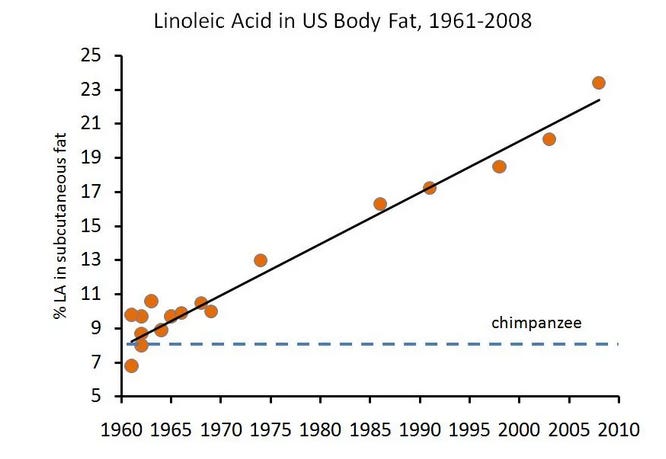A reply to Dynomight's "Thoughts on seed oil"

🌈 Abstract
The article is a reply to Dynomight's "Thoughts on seed oil", discussing the author's perspective on seed oil theory and the obesity epidemic.
🙋 Q&A
[01] Seed Oils as a Distraction
1. What is the author's view on seed oils being a "distraction"?
- The author believes that seed oils are not a distraction, but rather a key suspect in the obesity epidemic that needs to be thoroughly investigated.
- The author argues that the mainstream view of simply eating more fruits and vegetables to address obesity is an oversimplification that has failed for 50 years.
- The author is open to alternative explanations for the obesity epidemic, such as Vitamin A Theory, Lithium, or Magic Potato Theory, but finds the "eat more fruits and vegetables" approach unconvincing.
2. How does the author view the complexity of Modern PUFA Theory (MPT)?
- The author acknowledges that MPT is complex, but argues that the obesity epidemic is a complex issue that requires a more nuanced approach than the simplistic "eat more fruits and vegetables" recommendation.
- The author points out that the mainstream Energy Balance Model is also highly complex, suggesting that complexity is not inherently a weakness of a theory.
- The author argues that the difficulty in disproving MPT is due to the ubiquity of seed oils in the Western diet and the long-term effects of linoleic acid incorporation into cells and adipose tissue.
3. How does the author view the variations and disagreements within the seed oil camp?
- The author acknowledges that there are different factions within the seed oil camp, with some focusing on the oxidation products of linoleic acid, the balance of omega-6 to omega-3 fatty acids, or the idea that all double bonds (and therefore PUFAs) are inherently problematic.
- The author sees these variations as not necessarily a weakness, as all serious nutrition theories tend to have multiple aspects and disagreements among proponents.
[02] Potential Mechanisms of Harm from Seed Oils
1. What are the potential mechanisms of harm from seed oils that the author discusses?
- Linoleic acid being metabolized into arachidonic acid, leading to inflammation
- Linoleic acid becoming oxidized LDL, also leading to inflammation
- The ratio of omega-6 to omega-3 fatty acids being out of balance
- Seed oils not providing the same satiety signals as animal fats, leading to overeating
- Seed oils having a higher propensity to become trans fats when heated
2. How does the author view these potential mechanisms?
- The author argues that these are not "maybes" but rather well-established facts about the properties and effects of seed oils.
- The author suggests that the author of the original post is downplaying the strength of the evidence for these mechanisms.
[03] Epidemiological Evidence for Seed Oils
1. How does the author analyze the epidemiological evidence linking seed oil consumption and obesity?
- The author acknowledges that the correlation between seed oil consumption and obesity across countries is not a perfect 45-degree line, but argues that it still shows a positive relationship.
- The author examines the data across different continents and excludes certain outliers, finding that the positive relationship generally holds.
- The author suggests that the data may be unreliable due to issues with the underlying USDA data on linoleic acid content in foods.
2. What timeline does the author propose for the rise of seed oils and obesity?
- The author argues that seed oils have been present in the food supply since the 1800s, with adulteration of butter and lard with seed oils occurring as early as the 1880s.
- The author suggests that obesity was exceedingly rare before 1768, when seed oils were first invented in their modern, industrial form.
[04] What Would Convince the Author to Change Their Mind?
1. What would convince the author to abandon the seed oil hypothesis?
- The author states that they would be willing to abandon the seed oil hypothesis if presented with a better alternative hypothesis that can explain:
- The steady, growing trend in obesity, diabetes, and heart disease starting around 1850-1880
- The ability of some people to effortlessly lose 50-100 lbs with minor dietary changes
- Mechanisms more severe than the carcinogenic and endocannabinoid-stimulating effects of seed oils
- At least as good epidemiological evidence as the seed oil hypothesis
- The presence of the proposed factor in nearly all ultra-processed foods
2. How does the author view the mainstream "eat more fruits and vegetables" approach?
- The author strongly dismisses the mainstream view that simply eating more fruits and vegetables can solve the obesity epidemic, describing it as "literally as retarded as" this approach.
- The author argues that this oversimplified recommendation has failed for 50 years and is unconvincing, especially in light of the dramatic weight loss successes seen by some people who have avoided seed oils.